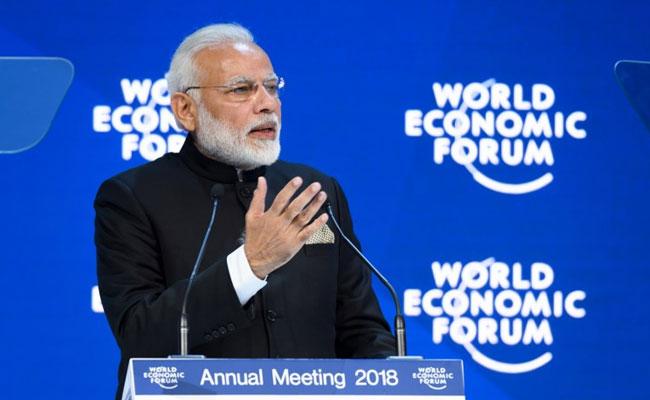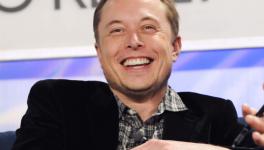World Economic Forum: Modi Among Fat Cats in the Snow

Image Courtesy: NDTV
The World Economic Forum’s annual gathering of 2018 has begun with much pomp in the resort town of Davos in Switzerland. For those who don’t know, the World Economic Forum (WEF) or the ‘fat cat forum’ as it is alternatively called, is an elite club of the world’s most powerful monopoly corporations. It is so elite, that just to get a plain vanilla membership of this forum, a company will have shell out about $ 52,000 or more than Rs. 30 lakhs in annual fees. Going by the claim on WEF’s website, its membership is limited to the leading 1000 companies of the world. What is more, to be a ‘Strategic Partner’ of the WEF, a corporation will have to pay an annual fee of $628,000 or more than Rs. 4 crores. Only 100 of the world’s most powerful corporations claim this privilege.
At the beginning of every year the CEOs of these corporations gather at Davos to hobnob and network with each other. Apart from its own membership, this is an invitation-only gathering. Often heads of states, particularly from the emerging economies, are invited, making it easy for the corporations to lobby with them in the comfort and luxury of the alpine resort, away from the noise and indignation of the hoi polloi and the national media.
Mr. Modi, who went to Davos with an entourage of ministers including the Finance Minister, is the first one to be there in the last two decades. The last time a Prime Minister went selling India to the CEOs at Davos was in 1997, when HD Deve Gowda attended the forum.
Addressing the plenary session of the WEF, Mr. Modi mouthed many platitudes on the theme of World Economic Forum – which is “creating a shared future in a fractured world”. True to form, he offered Yoga and Ayurveda as a remedy for climate change. He also spoke in strong defence of globalisation and for keeping borders open for trade and financial flows, and promised to undertake “radical reforms” in the Indian economy to make it easier for foreign investors. He boasted that under his rule, more than 90% of areas of investment are put under the automatic route for foreign investment and proclaimed that he has done away with 1400 existing laws to make it easy for businesses, despite the obstacles that the democratic system in India presented.
Mr. Modi’s words must have sounded particularly sweet to the gathered CEOs after the address of Christine Lagarde of the International Monetary Fund (IMF). Ms. Lagarde as well as the other economists of the IMF who spoke at the WEF spoke of increasing inequality, falling share of wages, and stagnating real wages that are threatening the world capitalist system and any future economic growth. Such uncharacteristic acknowledgement of the problems of world capitalism by, of all people, the IMF managing director, indicates how big the problem of inequalities really is.
But Mr. Modi seems to be oblivious to the damage that neoliberal globalisation has done all over the world as well as in India. His open invitation to these CEOs of the world’s biggest and most exploitative corporations to set up shop in India and exploit its cheap labour force, and promises of easy business environment which typically means suppression of labour laws and labour rights, are not going to address the needs and realities of Indians.
Instead of serenading the CEOs at Davos – the Prime Minister Mr. Modi would have done well to stay at home and think of how to revive the small businesses he has helped to destroy in the last three years with demonetisation and other scatter-brained policies. Despite the profits they make, the foreign multinational corporations and their Indian counter parts do not contribute to even 10% of India’s employment. Those that really contribute to the employment and income of most of India’s population – agriculture and the unorganised sector – do not seem to be on the policy radar of our Prime Minister. His policy is for the fat cats.
Get the latest reports & analysis with people's perspective on Protests, movements & deep analytical videos, discussions of the current affairs in your Telegram app. Subscribe to NewsClick's Telegram channel & get Real-Time updates on stories, as they get published on our website.
























